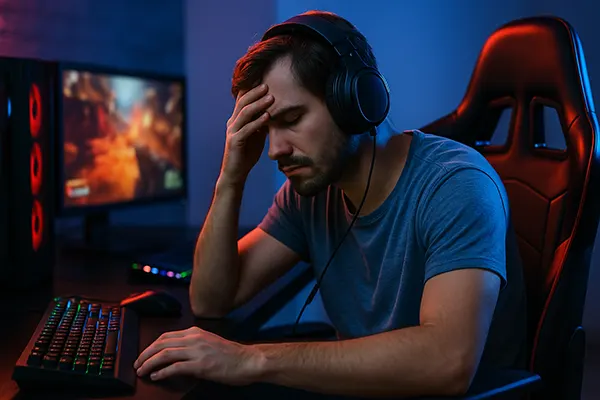
Dark Side of Esports: Gamer Burnout and Psychological Risks
Esports has become a global industry with millions of players and fans. While professional gaming brings fame, financial rewards and international recognition, it also carries hidden psychological dangers. Intense training routines, high performance expectations and the pressure of constant competition often lead to burnout, anxiety and long-term health issues. Understanding these risks is crucial to protect players and ensure the sustainable growth of competitive gaming.
What Causes Gamer Burnout in Esports?
Burnout in esports usually stems from long practice hours. Professional players can train for eight to twelve hours daily, leaving little space for rest or personal life. This extreme routine weakens motivation and gradually reduces performance despite continued effort.
Another factor is the pressure to succeed. Players are often compared to teammates and competitors, which increases stress. Unlike traditional sports, where contracts are more stable, esports careers can collapse after a series of poor results, intensifying the fear of failure.
Additionally, the lack of physical activity and irregular sleep patterns contribute to fatigue. Many players neglect balanced nutrition and healthy routines, making burnout not only a psychological issue but also a physical one.
Signs and Consequences of Burnout
Burnout manifests through reduced concentration, lack of motivation and emotional exhaustion. Players may feel detached from their teams, struggle to enjoy the game they once loved and display increased irritability.
If not addressed, these symptoms can escalate to depression or anxiety disorders. Some professionals leave the scene prematurely, unable to cope with the mental toll. Studies in 2024 and 2025 show that early retirement in esports is often linked to untreated burnout.
Moreover, the constant exposure to online criticism worsens the problem. Social media pressure intensifies self-doubt and accelerates the cycle of exhaustion.
Psychological Risks Beyond Burnout
Esports players face risks beyond fatigue. Anxiety disorders are common due to the constant need to perform under strict time limits and in front of large audiences. Even minor mistakes can be amplified on live broadcasts, leading to severe self-criticism.
Sleep disorders are another issue. Players often compete in international tournaments across time zones, which disrupts natural sleep rhythms. Chronic sleep deprivation leads to reduced cognitive function, slower reaction times and emotional instability.
Isolation is also a psychological risk. Many professionals spend most of their time practising indoors, with limited interaction outside of their gaming environment. This lack of social balance increases vulnerability to loneliness and depression.
Mental Health in the Esports Community
Fortunately, awareness of mental health in esports is growing. Organisations in 2025 have started to hire sports psychologists, offering regular therapy and resilience training. Such measures help players cope with stress and maintain focus during competitions.
Peer support has also proven effective. Teams encourage open conversations about mental health, reducing the stigma around seeking help. Players who share their struggles inspire others to prioritise psychological well-being.
Still, progress remains uneven. While some large organisations adopt wellness programmes, smaller teams may lack resources, leaving players exposed to unmanaged risks.

Strategies for Prevention and Support
Preventing burnout requires structural changes in esports. Balanced training schedules with designated rest periods can reduce stress and improve performance. Health experts recommend limiting practice to sustainable hours and integrating physical activity into routines.
Nutrition and sleep management are equally important. Teams that monitor players’ diet and establish strict sleep schedules notice significant improvements in both mood and results. Consistency is essential for long-term stability.
Finally, education is a key factor. By teaching young gamers about psychological risks before they enter the professional scene, the industry can prepare them for challenges. Knowledge equips players with strategies to manage stress early in their careers.
The Future of Mental Health in Esports
Looking ahead, esports must evolve to protect its players. The industry’s sustainability depends on healthier environments where mental well-being is as valued as technical skill. Without such change, high turnover rates will continue to damage careers and reputations.
Technological innovations may provide solutions. Tools for monitoring stress, heart rate and sleep patterns are already being tested in professional teams. These insights help detect early signs of burnout and guide interventions before problems escalate.
Ultimately, addressing the psychological side of esports is not only an ethical responsibility but also a competitive advantage. Teams that prioritise player well-being secure better long-term performance and attract positive recognition worldwide.
